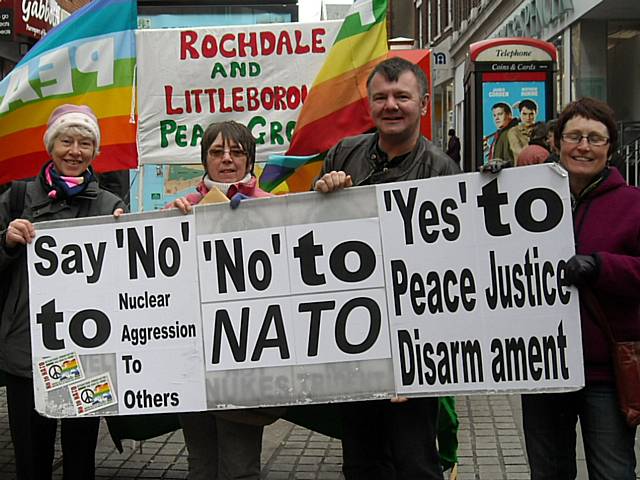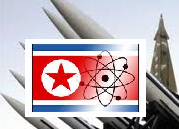Korean Peninsular Tension a significant problem for Asia Pacific
Written by kazi mahmood Tuesday, 09 November 2010 16:57 Last Updated on Tuesday, 09 November 2010 19:29
 The world has too many hot spots where unconventional warfare are being fought by nations against various groups and it does not need another war zone at this stage. The North Korean nuclear issue and the fact that South Korea threatened to use military force against Pyongyang is indeed a worry some factor.
The world has too many hot spots where unconventional warfare are being fought by nations against various groups and it does not need another war zone at this stage. The North Korean nuclear issue and the fact that South Korea threatened to use military force against Pyongyang is indeed a worry some factor.
Regional experts recently revealed to the WFOL.tv website that the growing tension in the Korean peninsular is among the most significant and acute problems the Asia Pacific region faces today. It affects badly the security issues and the stability of the whole region, they told WFOL. They added that the situation is made more difficult especially after the mechanism of the Six-Party Talks on Korean Nuclear issues was put to a halt as a result of the incident around the sinking of the South Korean corvette “Cheonan”.
A South Korean navy ship was struck by an explosive device in the Yellow Sea waters on March 26 this year leaving scores of sailors missing and several reportedly dead. While the incident is said to have taken place following an apparent explosion as it patrolled the disputed sea border with the North, there are no concrete evidence on the role played by the North against the South owned military vessel. According to a report put together by a commission of South Korean military and certain experts from the USA, Canada, Great Britain and Sweden, it was revealed that the “Cheonan” was sunk as the result of an external underwater explosion caused by a torpedo made in the DPRK. The evidence, the report pointed out overwhelmingly to the conclusion that the torpedo was fired by a North Korean submarine.
While this situation could easily lead to the negative scenario even involving military confrontation between the North and the South, thus triggering an escalation of the snowballing arms race in the region, things cooled down after North Korea threatened the use of Nuclear weapons against the South if it was militarily attacked. Certain regional states like Japan, Taiwan and several South East Asian (SEA) countries could use any escalation of instability between the North and the South as a pretext for providing their national armed forces with nuclear arsenal.
After the torpedo incident, which a report from a Russian agency denied was a North Korean torpedo but was in fact an old mine that went astray in the waters and did not belong to Pyongyang, North Korea vowed not to dismantle its nuclear program -- not even in exchange for economic aid. It cited the United States continued "hostile policy" as well the US support to South Korea in the boat incident and the Seoul's threats to use military force to avenge the death of its sailors as the reason for its refusal to pursue the 6 party talks.
"It was none other than the U.S. that pushed [North Korea] to acquiring nuclear deterrence and it is, therefore, wholly to blame for the nuclear issue on the Korean peninsula," the official Korean Central News Agency (KCNA) said before the North announced it wanted to pull out of the talks.
North Korea will never abandon its nuclear program, "even if the earth is broken to pieces unless the hostile policy towards [North Korea] is rolled back and the nuclear threat to it removed," the agency added.
This state of affairs is not in the interest of the US or of that of Japan and not at all in the interest of the SEA states, which are to be left unsafe and would suffer if the North was forced to use its nuclear weapons to defend itself against any fear of being attacked. First and foremost, the United States, which is a party in the 6 party talks should not play the role of the police in Asia by taking sides with the South despite the “Cheonan” incident. The North is blaming the US for being a 'friend' of the South and for taking its side, which Pyongyang said reinforced Seoul's decision to threaten the North with economic and military backlash.
In order to bring the parties back to the table of negotiations, it is partly the role of the US to stop its aggressive talks that it will altogether tighten the economic rope and enforce more 'sanctions' on the North as a result of the “Cheonan” incident. It is this type of biased talks that lead to the North pulling out from the talks and it is not such continuous talks that will force China for example to take the right step to literally force the North to comply to the decision to re-join such talks.
Hereby all the involved parties should promote the soonest reanimation of the Six-Party Talks on Korea's Nuclear issue and arrange constructive dialogue between Seoul and Pyongyang using existing positive experience on this matter. Failing this, the irreversible and controllable de-nuclearization of the Korean peninsular will become a near impossible and could worsen the situation on the whole Asia Pacific region, much to the detriment of the US itself.
Russia, for example, is regarded as an active and responsible partner within the Six-Party Talks on the Korean Nuclear Issue. This country firmly and sequentially stood for the reduction of tension as well as for the stability and de-nuclearization of the Korean peninsular. It is Moscow that has always remained supportive of the arrangements achieved through the negotiations process and urges other countries to coordinate their agenda as to make the talks acceptable for all the parties involved. China and the US should follow Moscow's resolve on the issue in order to bring a peaceful solution to the problem posed by North Korea's growing Nuclear power.
On October 9, 2006, the North Korean government issued an announcement that it had successfully conducted a nuclear test for the first time. Both the United States Geological Survey and Japanese seismological authorities detected an earthquake with a preliminary estimated magnitude of 4.2 in North Korea, corroborating some aspects of the North Korean claims. The US did claim then that the North had failed in its nuclear weapons programme as the test was insufficient and too small to be from a nuclear bomb. Other sources then informed WFOL.tv that the North had eventually developed its own 'mobile' nuclear bomb, which would be devastating since a nuclear bomb that can be carried around does not offer an guarantee of control to the West or the rest of the world.
In April 2009, reports surfaced that North Korea has become a "fully fledged nuclear power", an opinion shared by former IAEA Director General Mohamed ElBaradei. On May 25, 2009, North Korea conducted another nuclear test, which is believed to have been the cause of a magnitude 4.7 seismic event. Although there is no official information about the test's location, it is believed that it happened in the north-eastern region near Kilju, the site of North Korea's first nuclear test.
On October 21, 1994, the United States and North Korea signed an agreement-the Agreed Framework-calling upon Pyongyang to freeze operation and construction of nuclear reactors suspected of being part of a covert nuclear weapons program in exchange for two proliferation-resistant nuclear power reactors. The agreement also called upon the United States to supply North Korea with fuel oil pending construction of the reactors. An international consortium called the Korean Peninsula Energy Development Organization (KEDO) was formed to implement the agreement.KEDO announced November 21, 2003 that it would suspend construction of the two light-water nuclear reactors in North Korea for one year beginning December 1. The suspension came in response to Pyongyang’s failure to meet “the conditions necessary for continuing” the project, according to the KEDO announcement. (armscontrol.org)
KEDO further stated that the project’s future “will be assessed and decided by [its] Executive Board before the expiration of the suspension period.” But a Department of State spokesperson said several days earlier that there is “no future for the project.”
The most recent nuclear crisis began when Washington announced that Pyongyang admitted during an October 4, 2002 bilateral meeting to possessing a uranium-enrichment program, which could be used to build nuclear weapons and would violate North Korea’s commitment to forgo the acquisition of such weapons. North Korea has denied that it said this. In response to the reported admission, KEDO suspended oil shipments to North Korea the next month. North Korea reacted December 12 by announcing that it would restart the nuclear facilities governed by the Agreed Framework. After a series of exchanges with the International Atomic Energy Agency (IAEA), IAEA inspectors left the country December 31 after Pyongyang expelled them. North Korea announced on January 10, 2003 that it was withdrawing from the NPT, effective the next day. Pyongyang’s official status with the treaty remains ambiguous. (armscontrol.org)
Unlike other states, Russia does not use the Korean confrontation and Six-Party Talks for its national gains. An observer told WFOL.tv that Russia is worried only about the security issues in the Korean peninsular and the Asian region in whole. Being the chairman of the working group of the Six-Party Talks Russia plays first fiddle in elaborating mechanisms of security in North-Eastern Asia and demonstrates its reasonable and balanced approach.
Quote this article on your site
To create link towards this article on your website,
copy and paste the text below in your page.
Preview :
Tuesday, 09 November 2010
© 2010 - wfol.tv
Genies in a bottle
Eyes in Sky - This video will really scare you
Though we do not really know who took the videos and where it originates, we have the information that it was taken after the Indonesian earthquake in Padang, Riau. If you look patiently at the video, you will see a pair of eyes that is formed in the clouds overlooking a village in Indonesia. It will really shock and scare you!
However, apparently this video was taken a few years ago in Russia. Hence the source is unknown and the location too but it is a very real video, not a graphic picture.
A 'crawling Jin' in the street?
http://www.youtube.com/watch?v=TBQjfCo3kL4
Is this a Jin crawling in the street in Palestine? The author who posted the video on Youtube has this to say: "This video came from first source of busines's security camera in Rahat - palstine.
Video: Singapore's haunted condominiums
France: Jinn going to Masjid?
Jinns in a bottle - true story
Most Read Articles Today
- NATO shows its „democratic“ face
- NATO Seeks To Expand Its Reach
- The Cost Russia Will Pay for NATO Rapprochement
- NATO zeigt ihr „demokratisches“ Gesicht
- Demolición de las estructuras del Estado
- Encircling Russia, Targeting China: NATO'S True Role
- After NATO Summit, U.S. To Intensify Military Drive Into Asia
- FIFA lambast UK's Sunday Times
- 100,000 Civilian Deaths: U.S. To Stay In Afghanistan Beyond 2014
- "Barisan Rakyat" to provide alternative candidates to PR
Global News
- 100,000 Civilian Deaths: U.S. To Stay In Afghanistan Beyond 2014
- After NATO Summit, U.S. To Intensify Military Drive Into Asia
- Taliban attack Afghan Nato base
- Russia-China-India meet to decide Asia Pacific future
- Exclusive: Afghanistan - behind enemy lines
- Japan Seeks U.S. Military Support Against China, Russia
- Japan Thanks U.S. For Support In Disputes With China, Russia


 On November 19 and 20, NATO leaders meet in Lisbon for what is billed as a summit on “NATO’s Strategic Concept”. Among topics of discussion will be an array of scary “threats”, from cyberwar to climate change,
On November 19 and 20, NATO leaders meet in Lisbon for what is billed as a summit on “NATO’s Strategic Concept”. Among topics of discussion will be an array of scary “threats”, from cyberwar to climate change,
 Nato leaders will be gathering for their summit meeting in Lisbon later this week and no doubt Afghanistan will be at the top of the agenda.
Nato leaders will be gathering for their summit meeting in Lisbon later this week and no doubt Afghanistan will be at the top of the agenda.

 The NATO summit which will convene in Lisbon on November 19-20 will adopt the alliance's new strategic concept switching NATO from regional defense to global-scale missions. In practice, the reform will institutionalize the West's victory in the Cold World War III.
The NATO summit which will convene in Lisbon on November 19-20 will adopt the alliance's new strategic concept switching NATO from regional defense to global-scale missions. In practice, the reform will institutionalize the West's victory in the Cold World War III.



























